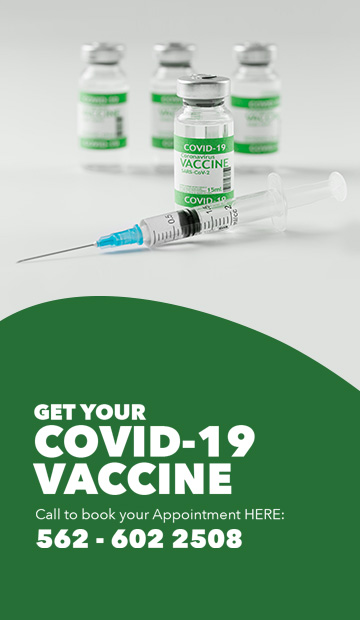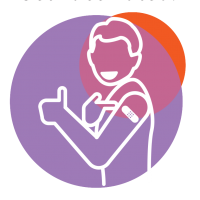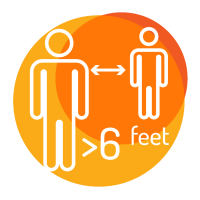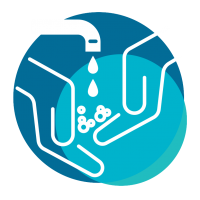

- Building defenses against COVID-19 in this facility and in your community is a team effort. And you are a key part of that defense.
- Getting the COVID-19 vaccine adds one more layer of protection for you, your coworkers, patients, and family

Here are ways you can build people’s confidence in the new COVID-19 vaccines in your facility, your community, and at home:
- Get vaccinated and enroll in the v-safe text messaging program to help CDC monitor vaccine safety.
- Tell others why you are getting vaccinated and encourage them to get vaccinated.
- Learn how to have conversations about COVID-19 vaccine with coworkers, family, and friends
How mRNA COVID-19 Vaccines Work
Understanding the virus that causes COVID-19.
Coronaviruses, like the one that causes COVID-19, are named for the crown-like spikes on their surfaces, called spike proteins.These spike proteins are ideal target for vaccines.
What is mRNA?
messenger RNA, or mRNA, is a genetic material that tells your body how to make proteins.
What is in the vaccine?
The vaccine is made of mRNA wrapped in a coating that makes delivery easy and keeps the body from damaging it.
How does the vaccine work?
The mRNA in the vaccine teaches your cells how to make copies of the spike protein. If you are exposed to the real virus later, your body will recognize it and know how to fight it off.

COVID – 19 Vaccines
Vaccines (shots) are one of the tools we have to fight the COVID-19 pandemic.

To stop this pandemic, we need to use all of our prevention tools. Vaccines are one of the most effective tools to protect your health and prevent disease. Vaccines work with your body’s natural defenses so your body will be ready to fight the virus, if you are exposed (also called immunity). Other steps, like wearing a mask that covers your nose and mouth and staying at least 6 feet away from other people you don’t live with, also help stop the spread of COVID-19.
Studies show that COVID-19 vaccines are very effective at keeping you from getting COVID-19. Experts also think that getting a COVID-19 vaccine may help keep you from getting seriously ill even if you do get COVID-19. These vaccines cannot give you the disease itself.

The vaccines are safe.
The U.S. vaccine safety system makes sure that all vaccines are as safe as possible. All the COVID-19 vaccines that are being used have gone through the same safety tests and meet the same standards as any other vaccines produced through the years. A system in place across the entire country that allows CDC to watch for safety issues and make sure the vaccines stay safe.

Different types of COVID-19 vaccines will be available.
Most of these vaccines are given in two shots, one at a time and spaced apart. The first shot gets your body ready. The second shot is given at least three weeks later to make sure you have full protection. If you are told you need two shots, make sure that you get both of them. The vaccines may work in slightly different ways, but all types of the vaccines will help protect you.

The vaccines may cause side effects in some people, like sore muscles, feeling tired, or mild fever. These reactions mean the vaccine is working to help teach your body how to fight COVID-19 if you are exposed. For most people, these side effects will last no longer than a day or two. Having these types of side effects does NOT mean that you have COVID-19. If you have questions about your health after your shot, call your doctor, nurse, or clinic. As with any medicine, it is rare but possible to have a serious reaction, such as not being able to breathe. It is very unlikely that this will happen, but if it does, call 911 or go to the nearest emergency room.

When you get the vaccine, you and your healthcare worker will both need to wear masks.
CDC recommends that during the pandemic, people wear a mask that covers their nose and mouth when in contact with others outside their household, when in healthcare facilities, and when receiving any vaccine, including a COVID-19 vaccine.

Even after you get your vaccine, you will need to keep wearing a mask that covers your nose and mouth, washing your hands often, and staying at least 6 feet away from other people you do not live with. This gives you and others the best protection from catching the virus. Right now, experts don’t know how long the vaccine will protect you, so it’s a good idea to continue following the guidelines from CDC and your health department. We also know not everyone will be able to get vaccinated right away, so it’s still important to protect yourself and others.
What to Expect after Getting a COVID-19 Vaccine
COVID-19 vaccination will help protect you from getting COVID-19. You may have some side effects, which are normal signs that your body is building protection. These side effects may affect your ability to do daily activities, but they should go away in a few days. Some people have no side effects.
Common Side Effects:

Helpful Tips:
If you have pain or discomfort after getting your vaccine, talk to your doctor about taking an over-the-counter medicine, such as ibuprofen or acetaminophen.
To reduce pain and discomfort where you got the shot:
- Apply a clean, cool, wet washcloth over the area.
- Use or exercise your arm.
To reduce discomfort from fever:
- Drink plenty of fluids.
- Dress lightly.

When to call the doctor?
In most cases, discomfort from fever or pain is normal. Contact your doctor or healthcare provider:
- If the redness or tenderness where you got the shot increases after 24 hours.
- If your side effects are worrying you or do not seem to be going away after a few days.
Remember:
- Side effects may affect your ability to do daily activities, but they should go away in a few days.
- With some COVID-19 vaccines, you will need 2 shots in order to get the most protection. You should get the second shot even if you have side effects after the first shot, unless a vaccination provider or your doctor tells you not to get it.
- It takes time for your body to build protection after any vaccination. COVID-19 vaccines that require 2 shots may not protect you until about two weeks after your second shot. For COVID-19 vaccines that require 1 shot, it takes about two weeks after vaccination for your body to build protection.
- After you are fully vaccinated, you may be able to start doing some things you had stopped doing because of the pandemic. Visit CDC’s website for the latest recommendations. www.cdc.gov/coronavirus/vaccines.
Getting ‘Back to Normal’ Is Going to Take All of Our Tools
If we use all the tools we have, we stand the best chance of getting our families, communities, schools, and workplaces “back to normal” sooner:

Get Vaccinated.

Wear a Mask.

Stay 6 feet from others, and avoid crowds.

Wash Hands Often.
Call Now to Get Your COVID – 19 Vaccines HERE:
562-602-2508
COMMUNITY MEDICINE INC. 8800 ALONDRA BLVD, SUITE C. BELLFLOWER, CA 90706.
